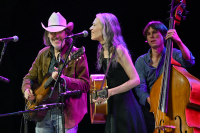Call me biased, but I believe that my illustrious compatriot Giuseppe Verdi composed ballet music like no one else. It is a pity he never felt like penning a full ballet score, and limited himself to composing balletic interludes for his glorious operas. As demonstrated by the work of eminent scholars, he possessed the unique ability to mentally choreograph a ballet. His approach to ballet music thus started with a detailed visualisation of the action, which fed into the unique innovative fluidity of his balletic compositions.
Take, for instance, the complex Peregrina ballet, composed for the Paris Opéra staging of Don Carlos. The demands of creating a work that would suit the hierarchy of the corps de ballet — i.e., two ‘sparkling’ solos for the prima ballerina, a shorter solo for the soloist, a joyous number for a couple of demi-solistes, a nicely intricate ensemble dance for the sujets and quadrilles, etc. — are met fully, but always with a good dose of underlying humour and a good deal of rules and groundbreaking ideas. It was almost inevitable that such inventiveness would attract, magnet-like, the choreographic ingeniousness of George Balanchine, who was to 20th-century ballet what Verdi was to 19th-century opera.
Ballo della Regina is Balanchine’s reading of Verdi’s interlude for Don Carlos and one of the works in which his creed, ‘dance for dance’s sake’, comes fully across. In Balanchine’s hands, Verdi’s music provides the inspiration for a choreography that is both evocative of a bygone ballet epoch and a refreshingly modern interpretation of the same. As such, it is a most welcome addition to the repertoire of the Royal Ballet.
On the opening night, Marianela Nuñez and Sergei Polunin led a refreshingly fizzy performance. Polunin dazzled with his virtuoso feats, but never indulged in mere mechanical sensationalism. Nuñez’s performance was also a mesmerisingly incandescent mix of diamond technique and superb interpretation. I only wish her captivatingly carefree approach to the fiendish technicalities of Balanchine’s choreography had inspired the other members of the corps de ballet, who looked nice but lacked that typical Balanchinian attack. This performance came shortly after Nuñez’s long-awaited and overdue debut as the eponymous heroine in MacMillan’s Manon a few weeks ago. Neither performance could have been any better, and both confirmed she is a true star.
It is unfortunate that the rest of the programme was not as exciting. Wayne McGregor’s new creation, Live Fire Exercise, has little or no ‘live fire’ and is too much of a choreographic ‘exercise’. Predictability seems to be the main characteristic of a choreography that is constantly overpowered by Michael Tippet’s ‘Fantasia Concertante on a Theme of Corelli’. As for Christopher Wheeldon’s Danse à Grande Vitesse, all I can say is that it already looks dated and seems to have lost its original sparkle.
Luckily, the Galina Ulanova centenary celebration gala on Sunday night was full of sparkle. The event, the latest in the Russian Ballet Icons series, was elegant in its neat, theatrically effective simplicity. Former Russian superstar Vladimir Vasiliev — a Russian icon himself — introduced the gala with heartfelt words for the late Russian star, whose dancing had such a tremendous impact on 20th-century ballet. As customary with galas, it is difficult to pinpoint what was good and what was not, for the response to such events is always very subjective.
Personally, I was thrilled by Evgenia Obratsova as Juliet, Svetlana Lunkina as Giselle, Daria Khokhlova’s Red Poppy variation, Thiago Soares’s flamboyant Acteon and the Tchaikovsky Pas de Deux performed by English National Ballet’s principals Daria Klimentova and Vadim Muntagirov.





Comments